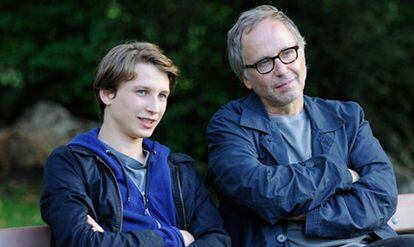Why cinema hasn’t taken to the stage
The Spanish film industry has been reluctant to bring the country’s best plays to the big screen


When French filmmaker François Ozon picked up the Golden Shell and Best Screenplay prizes at the last San Sebastián Film Festival for his movie In the House, it was a chance to pay a long overdue tribute to Spanish playwright Juan Mayorga, the writer of El chico de la última fila (The boy in the last row), the play on which Ozon’s film is based.
The successful author of works such as La tortuga de Darwin (Darwin’s tortoise), La paz perpetua (Perpetual peace) and Cartas de amor a Stalin (Love letters to Stalin), Mayorga has seen his works translated into and performed in dozens of languages. So how is it possible, asked Ozon, that a French director was the first filmmaker to adapt one of his works for the screen? Why doesn’t the theater feed into Spanish cinema, as happens in the British, French and Hollywood industries?
The question mark grows bigger once you consider another striking fact: in the last decade 80 percent of Spanish films have been made from adapted screenplays, which is to say they draw on stories and novels, but almost never from plays.
It is a rule with few exceptions, beyond The Method (2005) — an adaptation of Jordi Galceran’s El mètode Grönholm, directed by the Argentinean Marcelo Piñeyro but made with Spanish money — and the works of Ventura Pons, who collaborates with the playwright Sergi Belbel and adapts his work. We’re not, by the way, talking about classics by the likes of Lope de Vega or Pedro Calderón de la Barca here, but about the works of living authors.
“There is a certain rift between playwrights and filmmakers,” says EL PAÍS theater critic Marcos Ordóñez. And in Spain it is more noticeable because here “playwrights don’t collaborate on the writing of film scripts, as happens in other countries.” The names of Harold Pinter, Tom Stoppard and David Mamet spring to mind as examples.
“Spanish producers have an aversion to the theater,” notes Cesc Gay, director of the recent Una pistola en cada mano, who adapted his earlier films V.O.S. and Nico and Dani from stage plays. “They are more confident with a novel, they have a poor connection with the theater. When a director adapts a play, the initiative comes from him. The producers are moved by other types of literature. I ask myself why more texts by, for example, [theater group] Animalario, don’t appear in the cinema.”
Ventura Pons, who has adapted works by playwrights Lluïsa Cunillé and Josep Maria Benet i Jornet and, on three occasions, Sergi Belbel, believes there is more communication in other countries. “I am thinking of Britain’s Alan Bennett, author of The History Boys and The Madness of King George and the screenwriter of Prick Up Your Ears. Look at what people from the theater such as Sam Mendes and Patrice Chéreau bring to their films... Even historically, creators such as Bergman and Visconti gave their push to cinema. It’s obviously different, but I also come from the theater and I like films with substance, with dramatic bite. I can’t speak for other people, but in my case my career is my freedom, my independence and my taste. Sometimes you get the feeling of being out of touch with majority taste [laughs]. But I follow what I see as my truth. Contemporary cinema demands... spectacle.”
The man who unwittingly stimulated this debate, Juan Mayorga, explains that Spaniard Rómulo Aguillaume held the rights to El chico de la última fila for three years and tried in vain to bring it to the screen as a Spanish production. A Brazilian production suffered the same fate.
“On one hand what Ozon has done has given me a lot of joy because of the work made and because he is a great artist. But on the other hand, it makes me very sad to see that the high school in which the action takes place is called Gustave Flaubert and not Miguel de Unamuno or Pío Baroja, and that on screen we see day-to-day life in France and not in Spain,” says Mayorga.
Another missed opportunity? Will this Spanish separation of film and theater go on for much longer? “It might,” he says. “I’m surprised and saddened by the amount of Spanish directors who I’ve spoken to who don’t go to the theater.”










































